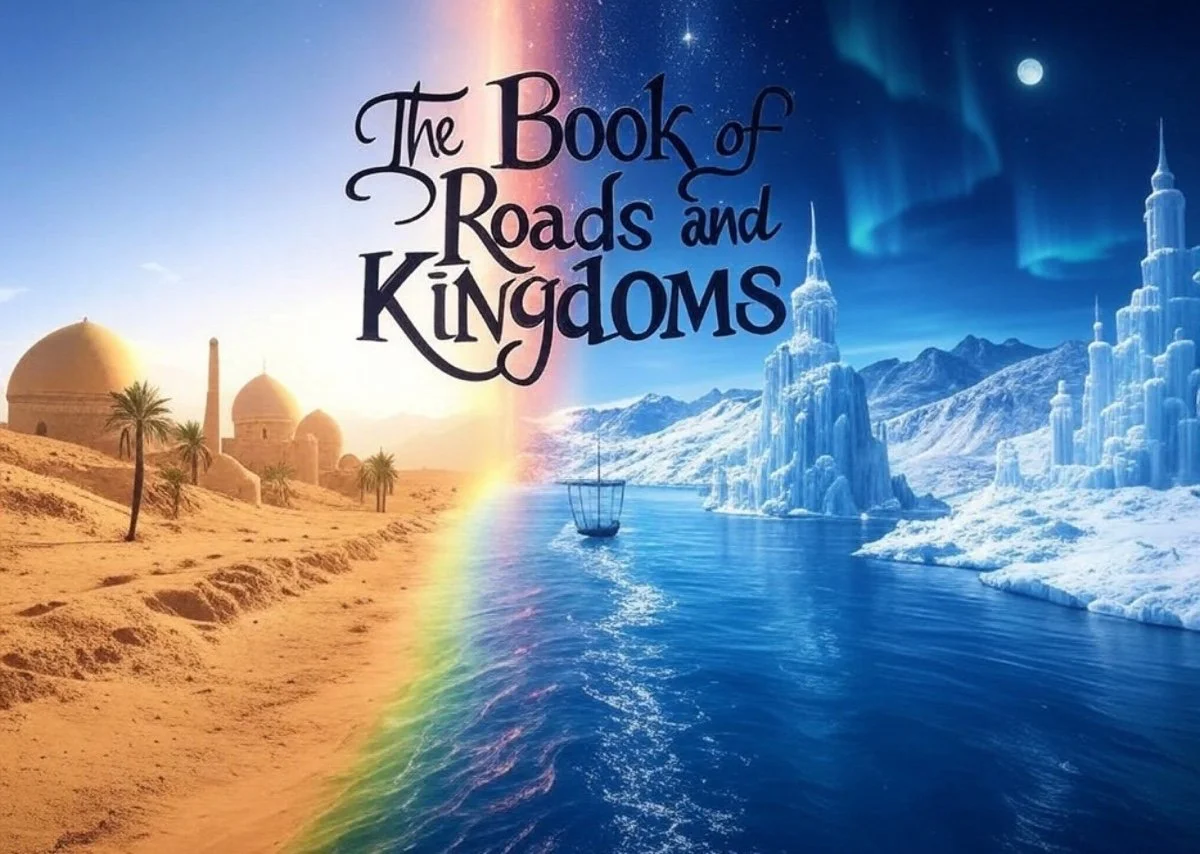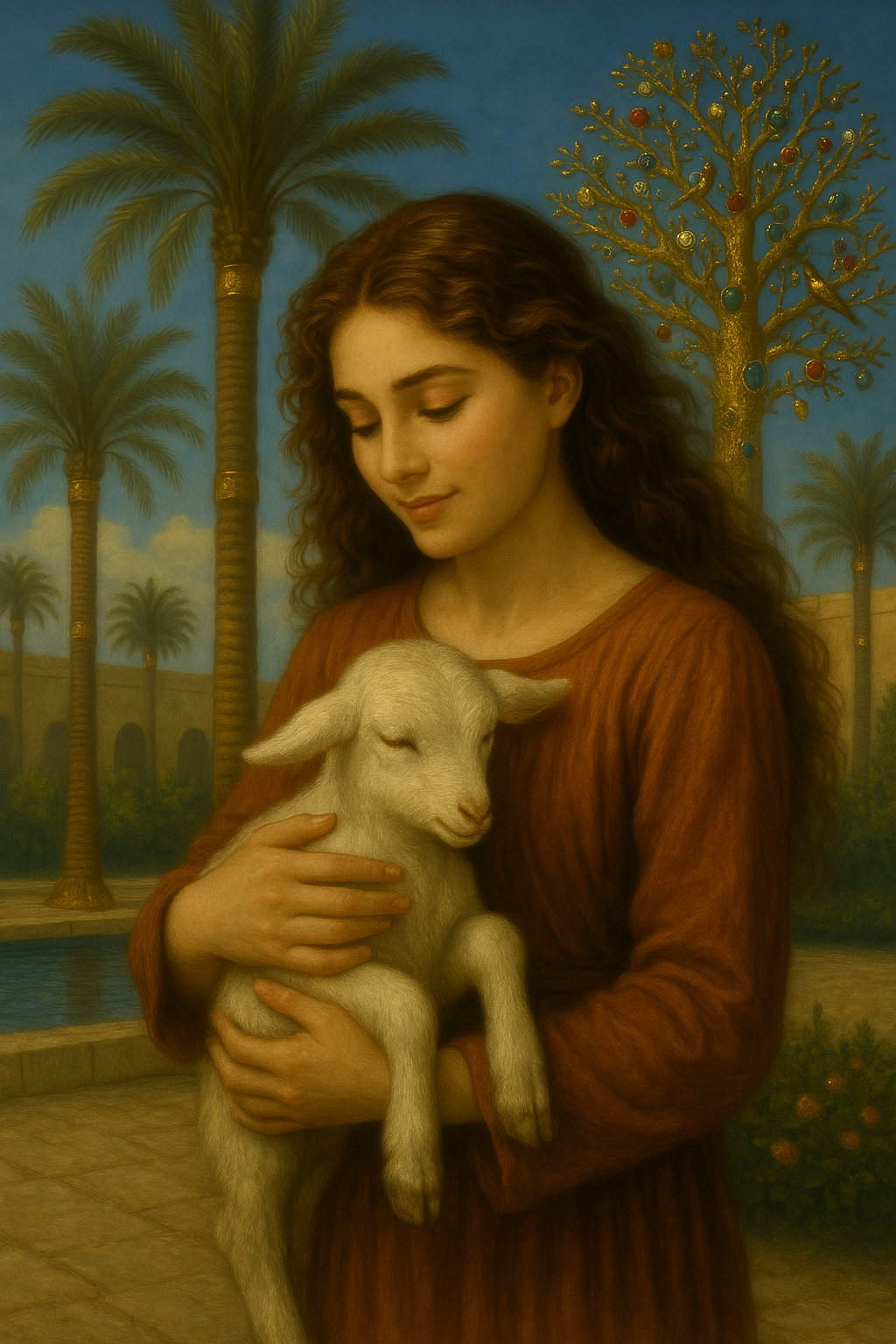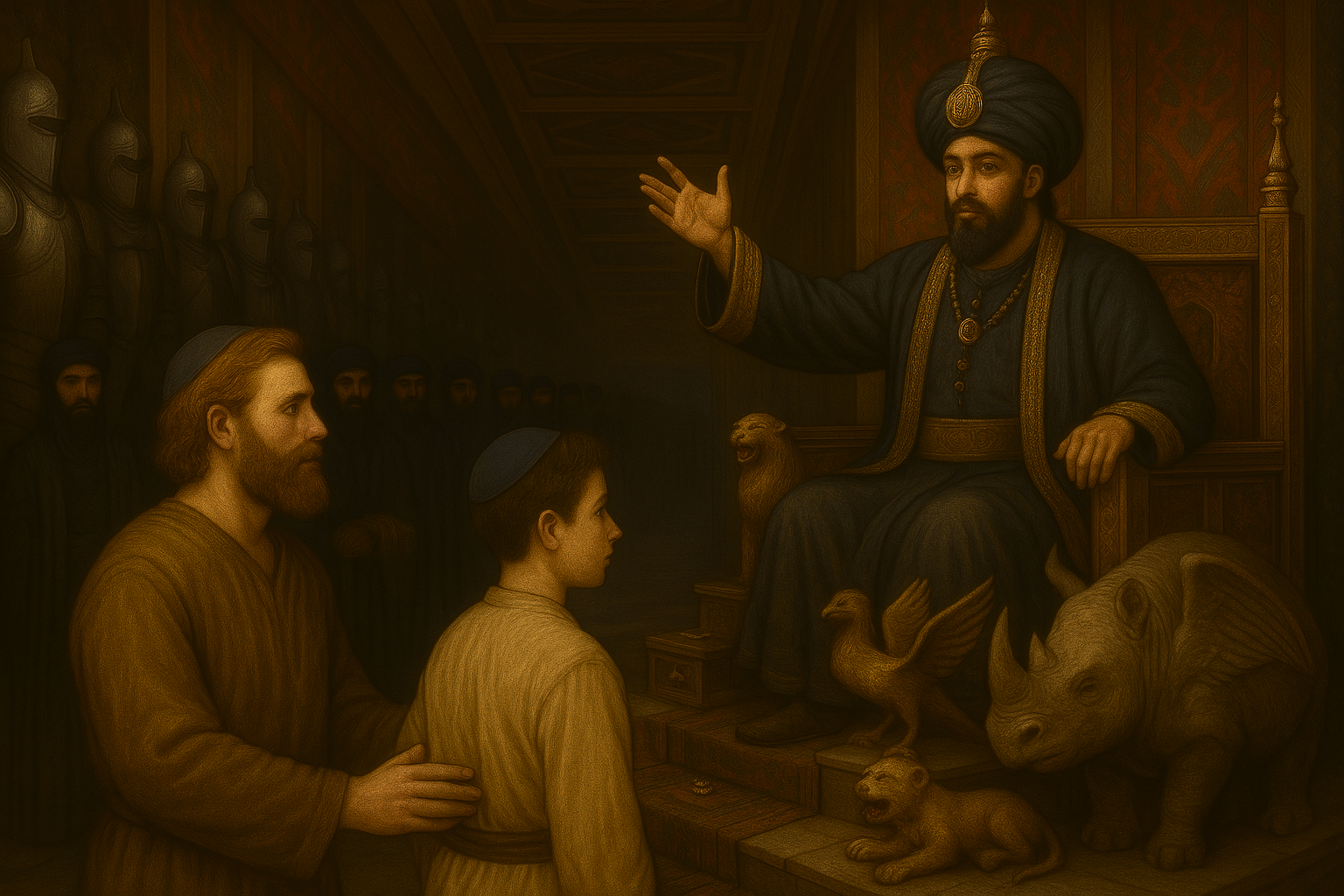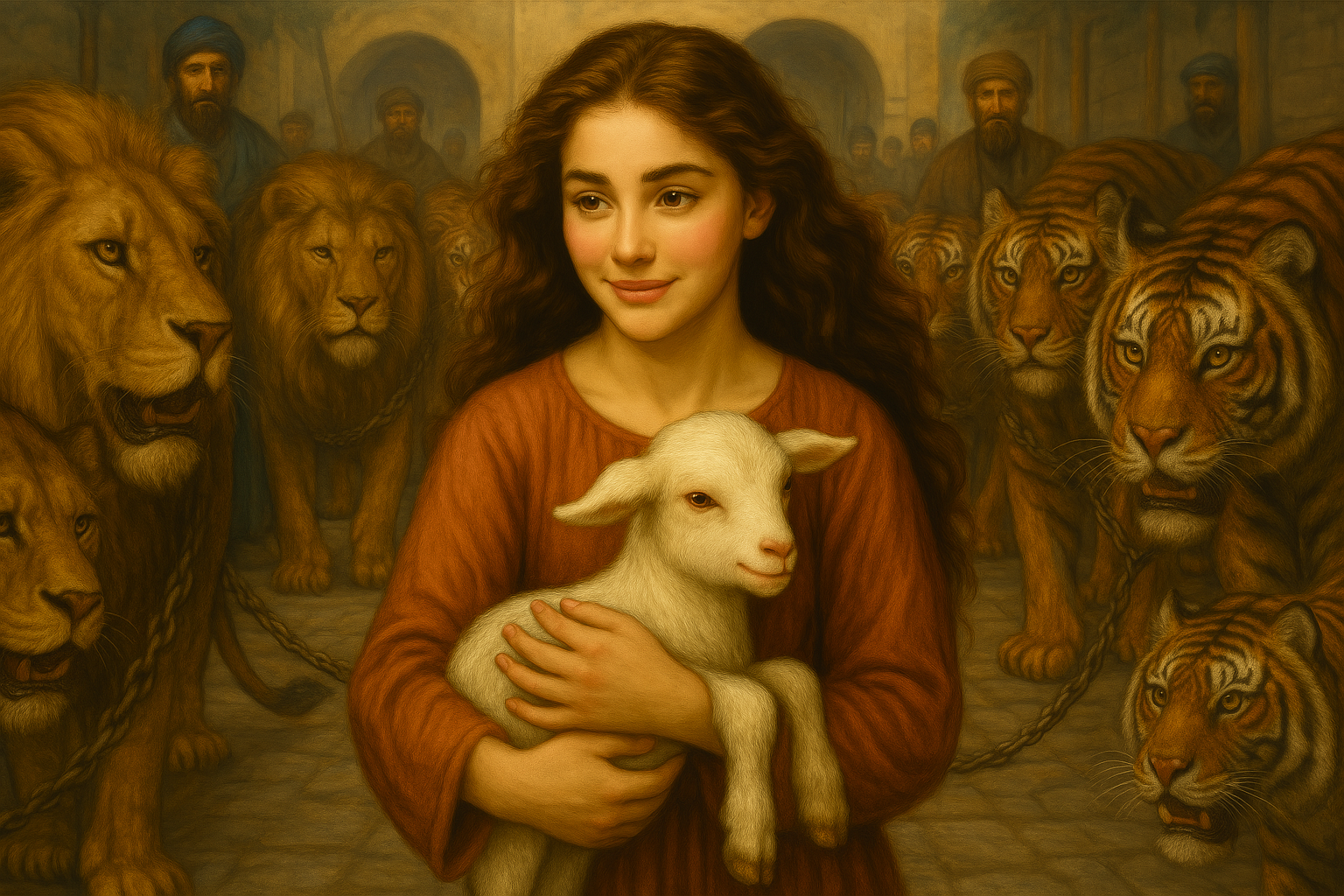
The Lion House
Scroll Down to Read
As we entered the public gate of the Caliph’s Palace we were taken to the Inn of the Horses, where Sus and the donkeys were stabled amongst the Governor’s own horses with their gold and silver saddles.
Rachel rode close behind me on Raksh, clutching little Gadya tightly between us. Although he wore a little leash, Rachel clutched the kid goat tightly between her slender arms as a squadron of shurta police accompanied us down wide columned arcades to the animal enclosures.
In pens and cages about us, apes hooted, storks squawked, and leopards growled. Rachel held my hand tightly as we gazed about ourselves with wonderment. Smaller beasts, foxes and peacocks and wildcats, seemingly tame, came right up to us and nuzzled our hands. Rachel laughed with pleasure and scratched a little red fox between the ears, causing his eyes to scrunch up, his tongue lolling out with enjoyment.
Next we came to the Court of the Elephants, were four of the great beasts tramped and trumpeted, each carrying eight Sindhi fire-hurlers in a great howdah on its back.
“Do you recall,” Ukban asked, “how Elazar the Hasmonean - Judah Maccabee’s Brother - came to fight an elephant?”
“He fought an elephant?” Rachel gasped.
“Yes,” Ukban continued, “for he thought it was carrying the Greek king, Antiochus Epiphanes. Elazar threw himself under the great beast and stabbed it with his lance, knowing it would fall on him and cause his own death.”
“So he gave his life to kill the tyrant?” I asked in amazement.
“Yes,” said Ukban, “but he was mistaken, it was only the general, Nicanor.”
The mahout clapped his hands, and the four elephants rose on their hind legs, trunks in the air. Rachel admired them, mouth agape. “I wish he had killed the king and saved the elephant,” she said wistfully.
Then we passed on to the Lion House, where fifty lions stood to our left and fifty tigers stood to our right, each one with a handler grasping its chain. The bolder ones licked their muzzles and stared hungrily at Gadya, who began to bleat and squirm against Rachel’s chest.”
“There, there, little one,” she soothed him, sounding much like Aunt Tamar. “There now, my dove. You’re safe, my beauty, my darling, don’t cry.”
The shurta guards led us on to the New Kiosk, where sat a deep pool plated inside and outside with burnished tin that sparkled in the sun. All around stood tall palms adorned with brass rings, their dates ripening under the Tammuz sky.
After that came the House of the Tree.
This was a great sculpture of a tree that looked just like the genuine article, except that its branches were of silver, its fruits were rubies, emeralds, pearls, and sapphires, and the little birds seeming to flit about its branches were made of gold.
“The girl and the goat may go no farther,” our shurta guide pronounced in steppe-inflected Arabic.
Uncle Judah and Rustam exchanged glances. “I will take her back to the menagerie,” he pledged.
Then we were off, toward the Palace of Paradise, its halls adorned in brocade of brilliant color, embroidered with goblets and strange beasts. Hundreds—if not thousands—of suits of armor, helmets, scimitars, spears, and battleaxes surrounded us on all sides as we walked the corridor. Passing rows of chamberlains robed in the solemn black of the Banu Abbas, we came at last to the Ninetieth Court.
There, upon a throne of blackened ebony, sat the severe, richly adorned Governor of Baghdad, Muhammad ibn Abdallah ibn Tahir.
The steps leading up to his throne, fashioned in the manner of King Solomon’s, bore golden lions and eagles on either side. By some magical or mechanical contrivance, the eagles flapped and screeched, while the lions raised their paws and roared as we approached.
“Ra’is al-Jalut,” called the Governor, raising one thin arm and wiggling his spidery fingers. “It has come to my attention that you have been making inquiries… about me.”
Uncle Judah bowed low. “Lord Governor,” he began, “I come before you on behalf of my friend, Aturfarnbag-i Farruxzatan, Mobad Mobadan of the Zoroastrian faith, whom the Caliph’s noble court has long deemed protected.”
“Protected, are they?” ibn Tahir murmured, narrowing his eyes. “This remains to be seen. In truth, Judah ibn Ahunai, it seems to me you ought to be here on behalf of yourself.”
“Of… myself, my Lord?” Uncle Judah asked, his voice cautious.
“Your activities lately have drawn scrutiny,” the Governor declared. “Summoning the Sura Academy’s Assembly of scholars to excommunicate the Karaites. Clashing with the Mamelukes who were sent to investigate. Surreptitious meetings with the Resh Amma, the Catholicos, and above all, the Mobad Mobadan. Entertaining Frankish, Khazar and Ethiopian emissaries in your home.”
Uncle Judah stepped back, then squared his shoulders. “Your Excellency,” he stated firmly, “much has been misinterpreted — or taken out of context — in the sequence as you presented it. The gathering in Sura was unarmed, and we feasted the Mamelukes, not fought them. Our aim was to ease tensions with our Karaite compatriots, not inflame them. And as for the merchants we welcomed to dinner, I have no indication that any were emissaries of a foreign crown.”
“The Greeks tell a tale,” he declared, “by a scholar named Aesop. It was only recently translated at the Bayt al-Hikma. A stork befriended a flock of jackdaws.
When they descended upon a farmer’s field to steal his corn, he flew among them—though he himself ate only fish. In the end, the stork was caught with the others in the farmer’s net.”
“Your Excellency…” Uncle Judah began.
“Hush. The farmer,” the Governor continued, “came forth to slay the jackdaws. ‘Wait!,’ exclaimed the stork. ‘Don’t you know me? I am not a jackdaw. I am a stork, an eater of fish.’ ‘That may be so,’ said the farmer. ‘But it is no matter. You are judged by the company you keep.’”
“Lord Governor,” Uncle Judah tried again, “My Cousin… Hasdai ibn Natronai…”
“Is under the protection of this court, as well as my shurta guards. You are not to excommunicate him or take any other action against him, is that understood?”
“Yes, Excellency,” Uncle Judah replied, “but…”
“I have not finished,” said the Governor, coolly. “I have heard your plea—and that of the Hudenan Peshobay. There is something we may attempt. But I offer no assurance of the outcome.”
Uncle Judah bowed his head expectantly. “I await your word, Lord Governor.”
“During the holy month of Ramadan,” ibn Tahir announced, “the court will sponsor a debate at the Bayt al-Hikma. The Jews, the Christians, the Magians, and the Sabians will be represented by their leaders, while I shall pick the advocate for Islam myself. The topic shall be as follows: which faith has the authentic revelation of the divine?”
“Your Excellency,” pleaded Uncle Judah, “surely every man believes his own faith to be true, for it comes to us from our parents, our people, and all those who are dearest to us. How can such a matter be altered by one simple debate?”
The Governor frowned, scratched his neatly trimmed beard, and rapped his fingers again. “The topic,” he pronounced, as if he had not just spoken otherwise, “shall be the nature of evil in the world. And now, Ra’is al-Jalut, I bid you good day.”
Just then the terrible roar of a savage beast cut through the walls of the palace, followed by a second and a third.
“What on Earth…” began the Governor.”
By now the growling, coughing and grunting outside was constant, a horrific hum, as if the waves of the sea were filled with hunger and rage.
And then all at once, we heard the bleating of a little kid goat, and then a piercing shriek, high and clear over all the animal sounds.
“Rachel!” Uncle Judah shouted.
“Lord Exilarch…” the Governor began.
This time, it was Uncle Judah who interrupted him. “I’m sorry, Excellency,” he said, “my Daughter is in danger.”
Ibn Tahir nodded decisively. “Guards,” he spoke to the shurta forces in the throne room, “accompany this man. Do whatever is necessary to protect his Daughter and family.”
“Yes, Excellency,” chimed the guards, and we were suddenly racing, out of the Ninetieth Court, past the rows of black-clad chamberlains, out of the Palace of Paradise, through the magnificent House of the Tree, its jeweled fruit and golden birds flashing on silver branches, through the New Kiosk, back to the Lion House, where what I saw froze my blood in my veins.
“Rachel!” Uncle Judah choked out. “No!”
Continue the Journey
Sneak peek at more of the adventures in Josiah’s quest to save Geonic Age Jewry.
-
In the garden of childhood, a promise is made — just as the future is glimpsed through a lattice and an unfinished game of Shahtranj.
-
As Kiev burns under a Norse siege, Josiah races through the city to gather his bogatyr allies and rescue a runaway princess… but a Valkyrie gets there first.

About the Art
If you'd like to learn more about how the pictures were created, click here.






